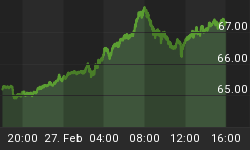Federal Reserve Chairman Ben Bernanke, once tagged "Helicopter Ben" for his comments on money creation, is now being portrayed in the media as an inflation fighter. In a Reuters article entitled, "Bernanke comes out swinging on inflation", the Chairman is reported to have taken the position that "low inflation was key to central banking success". The article described his stance as "a deliberate bid to counter fears he may be soft on price pressures".
This news strikes as ironic on several levels. First, the money and credit creation that the Federal Reserve employs to guide the economy is the source of inflation. In other words, inflation is a sure byproduct of undisciplined money creation. The assertion that low inflation is "key to central banking success" is akin to stating that low farm runoff levels are key to agricultural success. A central bank creates money and credit, in turn fueling inflation, just as a farm produces crops or livestock, releasing runoff of nitrogen and other pollutants in the process.
The only way a low inflation level can reflect success on the part of a central bank is as a management tool; it is an indication that relatively sound policies are being pursued and that public expectations about inflation and soundness of our monetary system can be sustained. So in effect, the news regarding inflation can be seen as public relations event. Little wonder then, that great care is taken in computing and presenting this data for public consumption.
It takes a little bit of skill and ingenuity, but negatives can be turned into positives. To push the farm analogy a little further, witness the manner in which the problem of runoff and pollutants is handled by farmers and resource councils. In order to mitigate negative environmental effects from farming, a New Zealand regional council aligns the interests of the environment with those of commercial farmers. Under the banner exclamation, "Clean water is good for our economy", the council's text goes on to exhort the positive benefits accrued from runoff management. "A big part of marketing our agricultural products to overseas customers is our high environmental standards and clean, green image...keeping our streams and rivers clean can help promote our agricultural products." So the lesson here is the importance of putting a positive spin on the sometimes negative byproducts of commercial endeavors.
Getting back to the commercial endeavor that is the Federal Reserve Bank: while Bernanke's public stance on inflation may seem unsurprising to current observers of the Fed, it is significant in one regard. The current spotlight on American central bank officials is so glaring that a man in Bernanke's high post is almost obliged to pronounce his intentions to the markets and the public at large. This, in spite of the fact that the Federal Reserve is an independent organization, unaccountable to American voters or the legislative branch in its decision making.
So why does the Fed Chairman bother to make these statements at all? Perhaps it has something to do with speaking to the court of public opinion. That could be the motivation behind Bernanke's "deliberate bid to counter fears" that he is "soft" on inflation. Furthermore, Chairman Bernanke took the opportunity during his testimony before the House of Representatives Committee on Financial Services Wednesday to reassert his support for the policies of the Greenspan Fed. To quote further from the aforementioned Reuters article, "My intention is to maintain continuity with this and the other practices of the Federal Reserve in the Greenspan era. I believe that, with this approach, the Federal Reserve will continue to contribute to the sound performance of the U.S. economy in the years to come."
Could it be that the Federal Reserve, a once avowed non-political structure, is assuming the politically pleasing glaze of transparency in order to help advance its ever evolving and expanding role in the economy?















